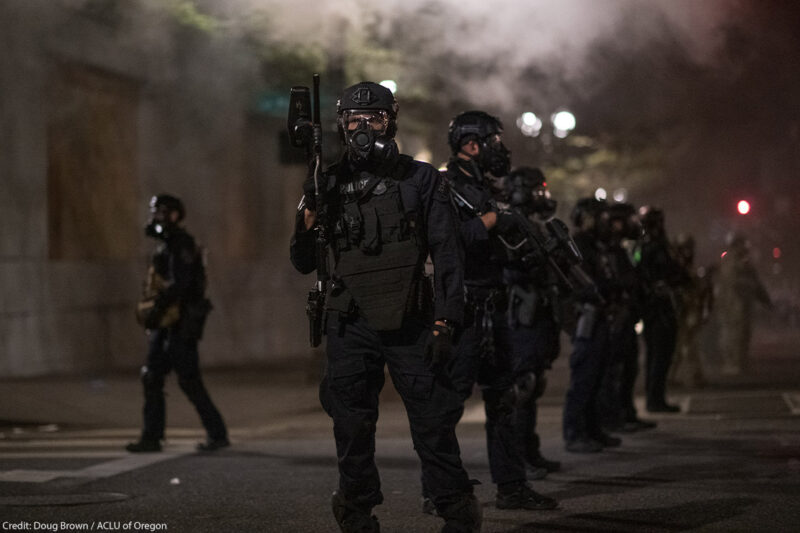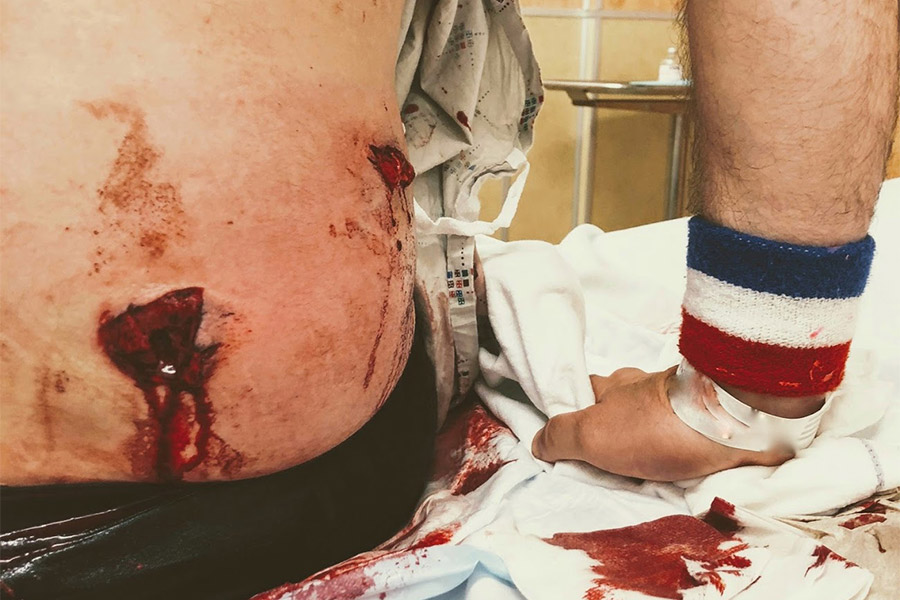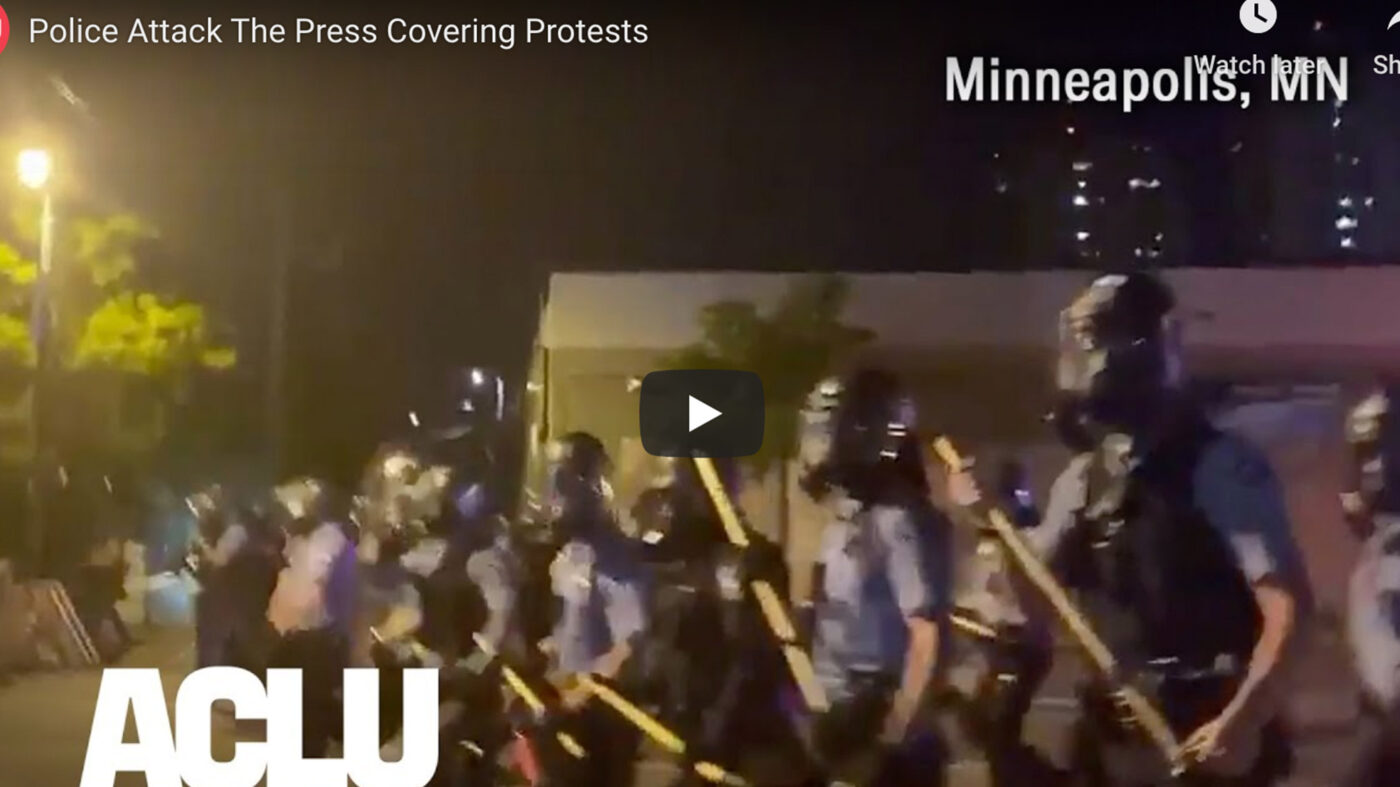The Law Enforcement Violence Trump Won’t Talk About


Day after day, night after night, protesters have been taking to the streets since the police killing of George Floyd. Led by local Black activists and grassroots groups, they’re chanting, singing, shouting, kneeling, marching, and even laying on the ground to demand justice for the many Black lives that have been taken by police. Everyone — from parents, grandparents, kids, and more — are showing up.
But Donald Trump from day one has expressed extreme hostility towards the Black Lives Matter movement. He has called on NFL owners to retaliate against players who dared to kneel in protest, said it was “terrible” to ask why Black Americans are still dying at the hands of law enforcement in this country, compared police killing and injuring Black people to golfers who “,” and has called for law enforcement to “dominate” protesters demanding that our legal system value Black lives. He has even encouraged police to abuse people in their custody.
As the movement and calls for change gain broader support from more Americans and people around the world, protesters are being met by even more brutality — in many cases by the same police departments whose racism and brutality they are protesting. Police and federal agents are spreading fear and panic in communities, threatening lives, and relentlessly attacking people simply exercising their First Amendment right to protest police racism and brutality. Law enforcement at all levels haven’t even spared U.S. military veterans, journalists, legal observers, and medics. This assault on the First Amendment has only escalated tensions, and emboldened white supremacists to spread terror and hate.
The ACLU is taking to the streets, legislatures and courts nationwide to demand an end to police violence and accountability for rights violations. Here is just a partial running list of federal and local law enforcement abuses against individuals exercising their First Amendment rights in Portland, Oregon:
- Federal agents with the U.S. Marshals Service U.S. Navy veteran Christopher David, who went to the protest to oppose police brutality and ask federal agents why they weren’t upholding their oath to the Constitution. The ACLU of Oregon is now suing on his behalf.
- Unidentified federal agents in military-style uniforms abducted ACLU of Oregon client Mark Pettibone from a sidewalk, then forced him into an unmarked minivan and drove him away for no apparent reason. The agents were later identified as belonging to Trump’s Department of Homeland Security. Pettibone explains how he ."
- DHS officers Nichol Denison, a U.S. Air Force veteran and member of the Portland “Wall of Moms,” while she was attending a Black Lives Matter protest. Without any warning, officers began launching cans of tear gas at her and other women beside her through gaps in the fence. Denison was hit repeatedly and was then struck far more forcefully in the head by a tear gas cannister that appeared to have been thrown from in front of her. She suffered a three-inch gash that was gushing blood, had to be taken to the VA hospital, where she received 11 stitches.
- Without warning and for no reason whatsoever, federal officers James McNulty, who was attending a protest for the first time, four times: three times with rubber bullets and one time with a pepper ball. At the emergency room, McNulty learned that one of the munitions that struck him in the back had not only gone through his clothes, but pieced his skin, fat layer, and at least one layer of muscle.

James McNulty sustains deep wound after federal officers fire munitions at him at a protest in Portland, Oregon.
- Maureen Healy was attending a Black Lives Matter protest with her child when, without warning, federal officers flash bangs, impact munitions, and tear gas cannisters into the crowd. Healy began to turn and run, but was hit in the head with a projectile that felt metallic and the size of a small can. She started bleeding profusely and called for help. While some volunteer medics attended to her injuries, federal officers continued to fire tear gas into the area, forcing them all to move.
- Federal officers shot Donovan LaBella, a 26-year-old protester, in the head with impact munitions. At the time LaBella was shot, he was standing across the street from the Hatfield Courthouse protesting while holding a music speaker above his head. He suffered severe injuries, arriving at the hospital in with a skull fracture. He subsequently underwent facial reconstruction surgery for his injuries.
- Mac Smiff was attending a Black Lives Matter protest when federal officers on the right side of his face with an indelible hard-cap paintball, just below the line of his helmet and just above a face mask he was wearing. The impact of the shot and resulting shock caused Smiff to fall to the ground. Smiff was partly blinded by the paint in his face and had a large contusion on his head. He received treatment from the volunteer medics, who told him that he may have suffered a concussion.
- , a decorated USMC veteran with combat experience in Iraq and Afghanistan and a co-founder of the “Wall of Vets,” was attending the Portland protests for the first time when, for no reason, a federal officer tried to strike Obermeyer. An officer pointed an automatic weapon in Obermeyer’s face while another officer shot him at point-blank range with an orange chemical irritant. One of the officers also struck Obermeyer in the face and chest with a baton. The gas was severely debilitating, and it took Duston days to recover from the gassing.
- Portland police tear-gassed reporters Alex Zielinski and Blair Stenvick of the Portland Mercury, many other journalists and legal observers, and physically assaulted and arrested KBOO reporter Cory Elia, even though he identified himself as press.

- Police hit freelance journalist Sergio Olmos with a truncheon and threatened to tear gas him because he was recording them. His press pass was clearly visible. Police also attacked journalist Donovan Farley with a wooden bat and sprayed him in the face with tear gas or pepper spray while he was trying to walk away from them. He had identified himself as press and was filming several police officers kneeling on a protester’s neck, Derek Chauvin-style.
- Portland police slammed reporter Beth Nakamura of The Oregonian in the back with a truncheon. She had her hands up, press pass in hand, and was saying “press, press.” The officer responded: “I don’t give a fuck.” The same day, police ordered reporter Zane Sparling of The Portland Tribune to leave an area where they were enforcing a dispersal order against protesters. Sparling responded that he was media. The officer responded: “I don’t give a shit! Go!” He then shoved Sparling into a wall, and another officer shot a crowd-control munition at his heel.
- When the police noticed journalist Brian Conley using his camera to record their action, officers launched at least one flash-bang grenade directly at him. He was nowhere near any protesters and there was no other target at which the police could have been aiming. The police later charged at him after telling him that it did not matter if he was media. Conley fell over while running away and only narrowly avoided a traumatic head injury.
- Portland police repeatedly sprayed large groups of protesters with tear gas from all sides in what is known as a “kettling” or “killbox” military strategy. Killboxing protesters cannot disperse them. Its sole purpose is to inflict pain and suffering.
- Portland police have crowds of people, shoving protesters to the ground, and hitting them with clubs and other instruments. They continue to do this night-after-night.
- Federal agents too have been deliberately attacking journalists and legal observers at protests, even after a court issued a temporary restraining order barring them from such unconstitutional attacks. A federal agent shot reporter Jonathan Levinson while he was trying to take a photo. As Levinson looked back and forth between his camera and the agent, trying to focus his lens, he saw the agent raise his weapon, deliberately point it at him, and fire several rounds. Levinson was wearing an OPB press pass with his name, his photograph, the OPB logo, and the word “MEDIA.” He was also wearing a helmet that said “PRESS” in large letters on the front and back and carrying two professional cameras with large, bulky lenses.
- A federal agent also shot journalist Brian Conley when he was trying to video an arrest. Conley yelled that he was press, over and over. Suddenly, without warning, federal agents shot him multiple times with impact munitions in his chest and his foot. An agent also threw a tear-gas canister directly at Conley, where it exploded above his head. He was carrying a large Micro Four Thirds camera with a telephoto lens and external 20W LED light mounted on it and was wearing a photographer’s vest that said “PRESS” on it as well as a helmet that said “PRESS.”
- Federal agents shot clearly-marked reporter Rebecca Ellis and separately prevented her from documenting their dispersal of protesters.
- Federal agents shot clearly-marked legal observer Haley Nicholson in her chest, just above her heart, from four feet away. Impact munitions should not be used at distances of less than 15 feet or above the waist.
- Federal agents deliberately sprayed toxic chemicals into the faces of multiple clearly-marked legal observers, including Bruce Knivlia and Kat Mahoney, at point blank range. They were all clearly identified in blue ACLU vests and green NLG hats. They also shot photojournalist Kathryn Elsesser, who was also clearly marked with “PRESS” on her helmet.
- Daniel Hollis, a videographer for VICE News, was wearing a helmet with the word “PRESS” on it and operating large, professional video-recording equipment when federal agents launched a barrage of munitions at Hollis and the members of the press around him, hitting Hollis near his groin and in his lower back.
- Federal agents and Portland police have also protest medics treating injured protesters and individuals. ACLU of Oregon clients Christopher Wise, Savannah Guest, and others have suffered numerous injuries from law enforcement deliberately firing rubber bullets, tear-gas, pepper spray, batons, and flash bangs at protest medics providing aid.
We’re witnessing similarly alarming and dangerous tactics being deployed in Kenosha, Wisconsin as people take to the streets to demand accountability and transformational change within the police and sheriff’s departments. This comes after police attempted to murder Jacob Blake by shooting him seven times in the back, fraternized with heavily-armed white supremacist militias during protests, and then let a white man who shot and killed two protesters walk away from the scene of the shooting.
There are multiple reports of law enforcement in unmarked vehicles with tinted windows and officers making arrests in Kenosha without identifying themselves or wearing insignia to identify their law enforcement agency. Kenosha police have also indiscriminately fired chemical and other weapons, including tear gas, pepper spray, rubber bullets, and pepper balls at protesters. We’re also receiving reports of protesters being arrested for violating curfew, and having possessions, like their cell phones, confiscated and not returned to them.
Notably, all of this is taking place in a county that has a history of severe racial disparities in policing; Black people in Kenosha County are to be arrested for marijuana possession than white people — almost double the national racial disparity in such arrests.
This is a fight for our democracy. The answer to protests over police brutality cannot be more brutality. We are unleashing the full firepower of the ACLU to defend our rights — in Portland, in Kenosha, and nationwide. We won’t be silenced.


